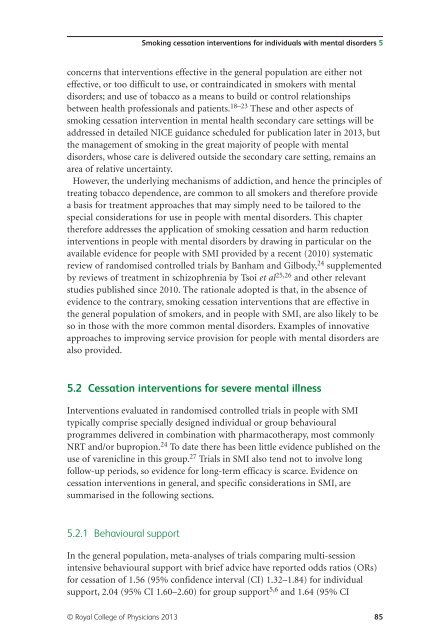Smoking and mental health - NCSCT
Smoking and mental health - NCSCT
Smoking and mental health - NCSCT
You also want an ePaper? Increase the reach of your titles
YUMPU automatically turns print PDFs into web optimized ePapers that Google loves.
<strong>Smoking</strong> cessation interventions for individuals with <strong>mental</strong> disorders 5<br />
concerns that interventions effective in the general population are either not<br />
effective, or too difficult to use, or contraindicated in smokers with <strong>mental</strong><br />
disorders; <strong>and</strong> use of tobacco as a means to build or control relationships<br />
between <strong>health</strong> professionals <strong>and</strong> patients. 18–23 These <strong>and</strong> other aspects of<br />
smoking cessation intervention in <strong>mental</strong> <strong>health</strong> secondary care settings will be<br />
addressed in detailed NICE guidance scheduled for publication later in 2013, but<br />
the management of smoking in the great majority of people with <strong>mental</strong><br />
disorders, whose care is delivered outside the secondary care setting, remains an<br />
area of relative uncertainty.<br />
However, the underlying mechanisms of addiction, <strong>and</strong> hence the principles of<br />
treating tobacco dependence, are common to all smokers <strong>and</strong> therefore provide<br />
a basis for treatment approaches that may simply need to be tailored to the<br />
special considerations for use in people with <strong>mental</strong> disorders. This chapter<br />
therefore addresses the application of smoking cessation <strong>and</strong> harm reduction<br />
interventions in people with <strong>mental</strong> disorders by drawing in particular on the<br />
available evidence for people with SMI provided by a recent (2010) systematic<br />
review of r<strong>and</strong>omised controlled trials by Banham <strong>and</strong> Gilbody, 24 supplemented<br />
by reviews of treatment in schizophrenia by Tsoi et al 25,26 <strong>and</strong> other relevant<br />
studies published since 2010. The rationale adopted is that, in the absence of<br />
evidence to the contrary, smoking cessation interventions that are effective in<br />
the general population of smokers, <strong>and</strong> in people with SMI, are also likely to be<br />
so in those with the more common <strong>mental</strong> disorders. Examples of innovative<br />
approaches to improving service provision for people with <strong>mental</strong> disorders are<br />
also provided.<br />
5.2 Cessation interventions for severe <strong>mental</strong> illness<br />
Interventions evaluated in r<strong>and</strong>omised controlled trials in people with SMI<br />
typically comprise specially designed individual or group behavioural<br />
programmes delivered in combination with pharmacotherapy, most commonly<br />
NRT <strong>and</strong>/or bupropion. 24 To date there has been little evidence published on the<br />
use of varenicline in this group. 27 Trials in SMI also tend not to involve long<br />
follow-up periods, so evidence for long-term efficacy is scarce. Evidence on<br />
cessation interventions in general, <strong>and</strong> specific considerations in SMI, are<br />
summarised in the following sections.<br />
5.2.1 Behavioural support<br />
In the general population, meta-analyses of trials comparing multi-session<br />
intensive behavioural support with brief advice have reported odds ratios (ORs)<br />
for cessation of 1.56 (95% confidence interval (CI) 1.32–1.84) for individual<br />
support, 2.04 (95% CI 1.60–2.60) for group support 5,6 <strong>and</strong> 1.64 (95% CI<br />
© Royal College of Physicians 2013 85














